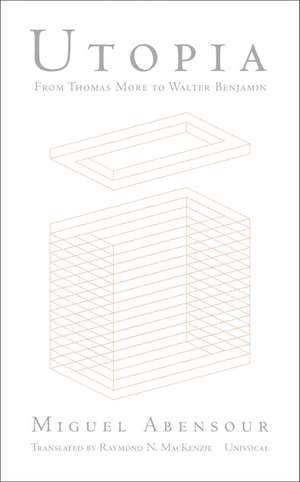Utopia from Thomas More to Walter Benjamin: Univocal
Autor Miguel Abensouren Limba Engleză Paperback – 15 ian 2017
“Utopia poses a question. Not simply in the sense of a problem to be resolved and at the same time eliminated . . . but in the sense that, within the economy of the human condition, utopia, the aim of social alterity—of all social otherness—is ceaselessly being reborn, coming back to life despite all the blows rained down upon it, as if human resistance had taken up residence within it.”
For the French philosopher Miguel Abensour, the fictional genre of utopia has provided thinkers and artists a fertile ground to explore for the past 500 years, both as a way to imagine new emancipatory practices of shared existence and as a tyrannical imposition of power. Here, Abensour’s project is to examine the idea of utopia in two different but powerful moments in its trajectory: first, utopia’s beginning, when Thomas More sought a path for justice through a world in transformation, and second, when utopia faced its greatest danger, the moment that Walter Benjamin called “catastrophe.”
For the French philosopher Miguel Abensour, the fictional genre of utopia has provided thinkers and artists a fertile ground to explore for the past 500 years, both as a way to imagine new emancipatory practices of shared existence and as a tyrannical imposition of power. Here, Abensour’s project is to examine the idea of utopia in two different but powerful moments in its trajectory: first, utopia’s beginning, when Thomas More sought a path for justice through a world in transformation, and second, when utopia faced its greatest danger, the moment that Walter Benjamin called “catastrophe.”
Din seria Univocal
-
 Preț: 152.92 lei
Preț: 152.92 lei -
 Preț: 169.34 lei
Preț: 169.34 lei -
 Preț: 169.04 lei
Preț: 169.04 lei -
 Preț: 169.34 lei
Preț: 169.34 lei -
 Preț: 151.99 lei
Preț: 151.99 lei -
 Preț: 137.79 lei
Preț: 137.79 lei -
 Preț: 169.70 lei
Preț: 169.70 lei -
 Preț: 102.45 lei
Preț: 102.45 lei -
 Preț: 130.22 lei
Preț: 130.22 lei -
 Preț: 138.14 lei
Preț: 138.14 lei -
 Preț: 127.42 lei
Preț: 127.42 lei -
 Preț: 176.61 lei
Preț: 176.61 lei -
 Preț: 169.34 lei
Preț: 169.34 lei -
 Preț: 118.58 lei
Preț: 118.58 lei -
 Preț: 153.99 lei
Preț: 153.99 lei -
 Preț: 130.89 lei
Preț: 130.89 lei -
 Preț: 153.24 lei
Preț: 153.24 lei -
 Preț: 137.48 lei
Preț: 137.48 lei -
 Preț: 169.70 lei
Preț: 169.70 lei -
 Preț: 215.88 lei
Preț: 215.88 lei -
 Preț: 138.46 lei
Preț: 138.46 lei - 9%
 Preț: 141.58 lei
Preț: 141.58 lei - 13%
![[...After the Media]: News from the Slow-Fading Twentieth Century](https://i1.books-express.ro/bs/9781937561161/after-the-media.jpg) Preț: 141.58 lei
Preț: 141.58 lei - 18%
 Preț: 126.61 lei
Preț: 126.61 lei - 18%
 Preț: 126.61 lei
Preț: 126.61 lei - 14%
 Preț: 139.36 lei
Preț: 139.36 lei - 19%
 Preț: 123.77 lei
Preț: 123.77 lei - 10%
 Preț: 139.36 lei
Preț: 139.36 lei - 10%
 Preț: 139.36 lei
Preț: 139.36 lei - 5%
 Preț: 130.75 lei
Preț: 130.75 lei - 14%
 Preț: 140.42 lei
Preț: 140.42 lei - 29%
 Preț: 97.20 lei
Preț: 97.20 lei - 22%
 Preț: 166.45 lei
Preț: 166.45 lei -
 Preț: 189.19 lei
Preț: 189.19 lei - 29%
 Preț: 97.20 lei
Preț: 97.20 lei -
 Preț: 189.13 lei
Preț: 189.13 lei -
 Preț: 142.31 lei
Preț: 142.31 lei -
 Preț: 145.87 lei
Preț: 145.87 lei -
 Preț: 197.45 lei
Preț: 197.45 lei
Preț: 129.59 lei
Preț vechi: 152.61 lei
-15% Nou
Puncte Express: 194
Preț estimativ în valută:
24.81€ • 25.89$ • 20.80£
24.81€ • 25.89$ • 20.80£
Carte indisponibilă temporar
Doresc să fiu notificat când acest titlu va fi disponibil:
Se trimite...
Preluare comenzi: 021 569.72.76
Specificații
ISBN-13: 9781945414008
ISBN-10: 1945414006
Pagini: 114
Dimensiuni: 127 x 203 x 10 mm
Greutate: 0.11 kg
Ediția:1
Editura: University of Minnesota Press
Colecția Univocal Publishing
Seria Univocal
ISBN-10: 1945414006
Pagini: 114
Dimensiuni: 127 x 203 x 10 mm
Greutate: 0.11 kg
Ediția:1
Editura: University of Minnesota Press
Colecția Univocal Publishing
Seria Univocal
Notă biografică
Miguel Abensour is a French philosopher best known for his influence in shepherding the reception of the Frankfurt School in France. He has written several works on utopia, including L’homme est un animal utopique and most recently L’histoire de l’utopie et le destin de sa critique.
Raymond N. MacKenzie is professor of English at the University of St. Thomas.
Raymond N. MacKenzie is professor of English at the University of St. Thomas.
Recenzii
"Short but an interesting eclectic reading, this book surely is an enjoyable reading for theorists of politics and cultural studies."—Leonardo
